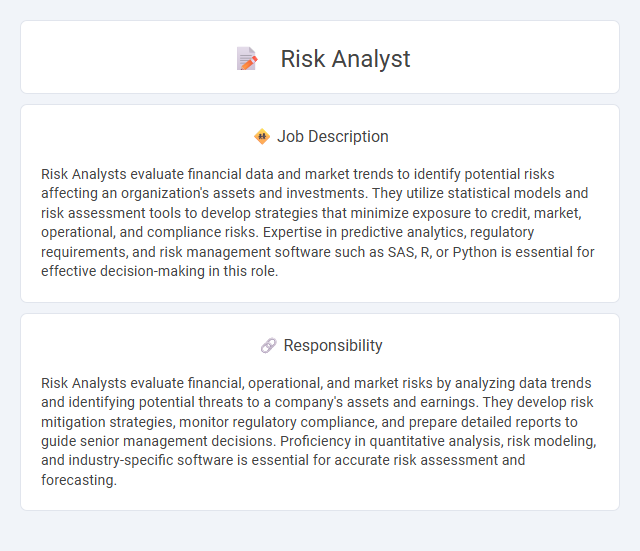
Risk Analysts evaluate financial data and market trends to identify potential risks affecting an organization's assets and investments. They utilize statistical models and risk assessment tools to develop strategies that minimize exposure to credit, market, operational, and compliance risks. Expertise in predictive analytics, regulatory requirements, and risk management software such as SAS, R, or Python is essential for effective decision-making in this role.
Individuals with strong analytical skills and attention to detail are likely suited for a Risk Analyst role, as it demands evaluating potential threats and uncertainties methodically. Those comfortable with data interpretation, critical thinking, and decision-making under pressure might find this position aligns well with their abilities. Conversely, people who struggle with ambiguity or lack patience for intensive data analysis may face challenges succeeding in this job.
Qualification
A Risk Analyst typically requires a bachelor's degree in finance, economics, statistics, or a related field, with certifications like FRM or CFA enhancing credibility. Proficiency in data analysis software, risk assessment tools, and strong quantitative skills are essential for evaluating financial risks effectively. Experience in financial modeling, regulatory compliance, and market risk management significantly improves job performance and career advancement opportunities.
Responsibility
Risk Analysts evaluate financial, operational, and market risks by analyzing data trends and identifying potential threats to a company's assets and earnings. They develop risk mitigation strategies, monitor regulatory compliance, and prepare detailed reports to guide senior management decisions. Proficiency in quantitative analysis, risk modeling, and industry-specific software is essential for accurate risk assessment and forecasting.
Benefit
Risk Analyst positions likely offer significant benefits such as competitive salaries and opportunities for professional growth. Employees might gain valuable experience in data analysis and decision-making that enhances career prospects. Access to specialized training and exposure to various industries could increase job security and marketability.
Challenge
Risk analyst roles likely present substantial challenges due to the need for accurately identifying and assessing potential threats that could impact an organization's financial health. Complex data sets and evolving market conditions probably require continuous learning and adaptation to maintain effective risk mitigation strategies. The position may involve high-pressure decision-making where the consequences of misjudgment can be significant for both the company and its stakeholders.
Career Advancement
Risk analysts play a critical role in identifying and mitigating financial, operational, and strategic risks within organizations, making their expertise essential for sound decision-making. Advancing a career in risk analysis often involves obtaining certifications such as FRM (Financial Risk Manager) or CRM (Certified Risk Manager), along with gaining experience in data analytics and regulatory compliance. Leadership opportunities, including roles like Risk Manager or Chief Risk Officer, are attainable through demonstrated proficiency in risk assessment, strategic planning, and effective communication of complex risk scenarios to stakeholders.
 kuljobs.com
kuljobs.com